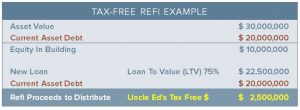COMMERCIAL REAL ESTATE VALUE
The other day, I received a call from a new investor we will call Bob. Bob was very excited to be an accredited investor at a reasonably young age and he was ready to learn. Rarely do I get a call that someone wants to learn. This put a smile on my face, and I asked what investment experience he had and his investing goals? I also asked what he wanted to learn, and to my surprise, he wanted to replicate what his late uncle had done for decades.
DEMAND FOR QUALITY HARD ASSETS
After discovering Bob had a few rental homes, the conversation turned to his uncle. I asked, “What did you like that your uncle did?” He explained, over time, his uncle purchased three apartment complexes for his investment portfolio. His uncle had figured out that there will always be demand for quality hard assets, whether from the debt side (lender) or the income side (tenant). It is not rocket science, but the strategy he employed with his knowledge makes this story so compelling.
LEARN FROM EXPERIENCED INVESTORS
His uncle, who we will call Ed, had invested initially with friends and family into CRE from his mid 30’s through his mid 40’s. Ed had learned everything he could about apartments from financing, management, taxes, etc. He watched more experienced investors buy, build, sell, refi, recap, and asked the Sponsors each time why they did what they did.
MONEY-MAKING STRATEGIES
Over a decade, Ed learned many money-making strategies but there was one that intrigued him the most and made the most sense. Uncle Ed learned that if he had a high-quality, well-located asset, he could use it to fund his lifestyle and retirement. Now, this isn’t anything new but there is simple brilliance in the rest of the story.
WELL-LOCATED APARTMENTS, LONG TERM HOLD
What uncle Ed did was buy three well-located apartment complexes. He had no intention of selling the assets and was very selective about each purchase. Knowing that the government (IRS) was very friendly to people who provided housing, he understood that as long as housing was needed, the government would make it financially attractive for him to be a long-term landlord.
BENEFITS TO OWNING APARTMENTS
The next part is pretty straight forward as Uncle Ed received the known benefits for owning apartment buildings:
- Cash Flow
- Deferred Taxes
- Depreciation
- Equity Appreciation
- Tenant Paying The Debt
REFI, CASH, HOLD
Now here is the fun part, what Ed had learned from his mentors, which is still true today, you do not need to sell the asset to make the big bucks. Selling is expensive, and selling is time-consuming. To replace that asset, you may or may not get the right price. If you do sell, can you find an investment to purchase, which is also an expensive endeavor. So how did Ed make his cash machine? After a 5-7 year hold period with cash flow and tax deferrals, Ed would refinance the asset, pull out a few million dollars, hold the asset for ongoing cash flow another 5-7 years, and repeat the process. All refinance proceeds are tax-free. Yes, tax-free.
THINGS THAT MAKE YOU GO HMMMM
Suppose you consider that the $2.5M that Ed received on this one transaction was repeatable four times over a 25-30 year period to the tune of $10M and he has three of these assets. In that case, Ed could receive several million dollars in tax-free refinance funds over the next 30 years of his life. Add to that; he continues to receive cash flow and tax deferrals the entire time he owns the property. This strategy is not an overnight model, it takes time but most anything of real value takes time to build.


